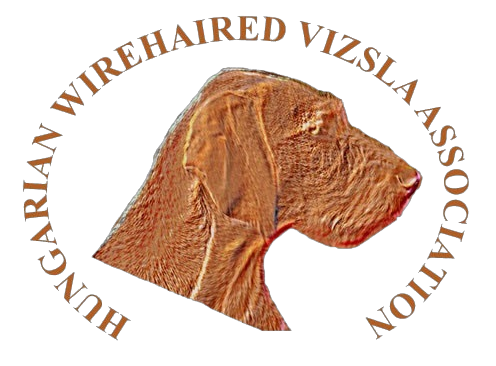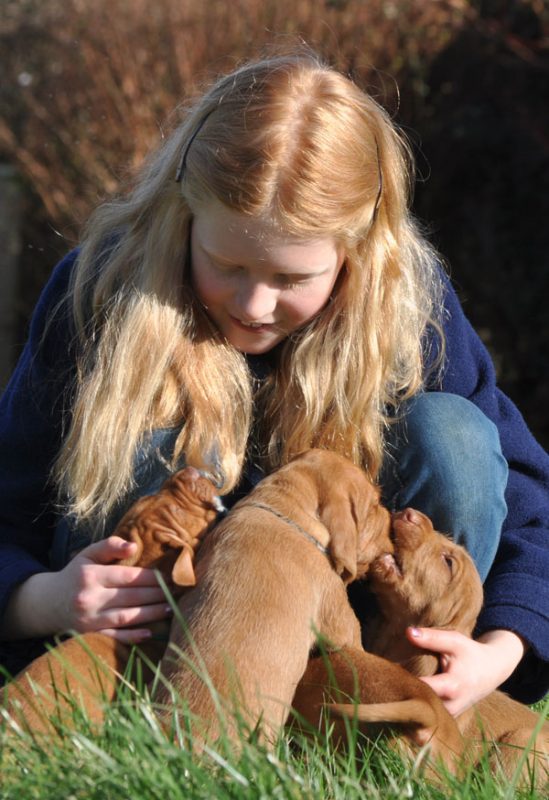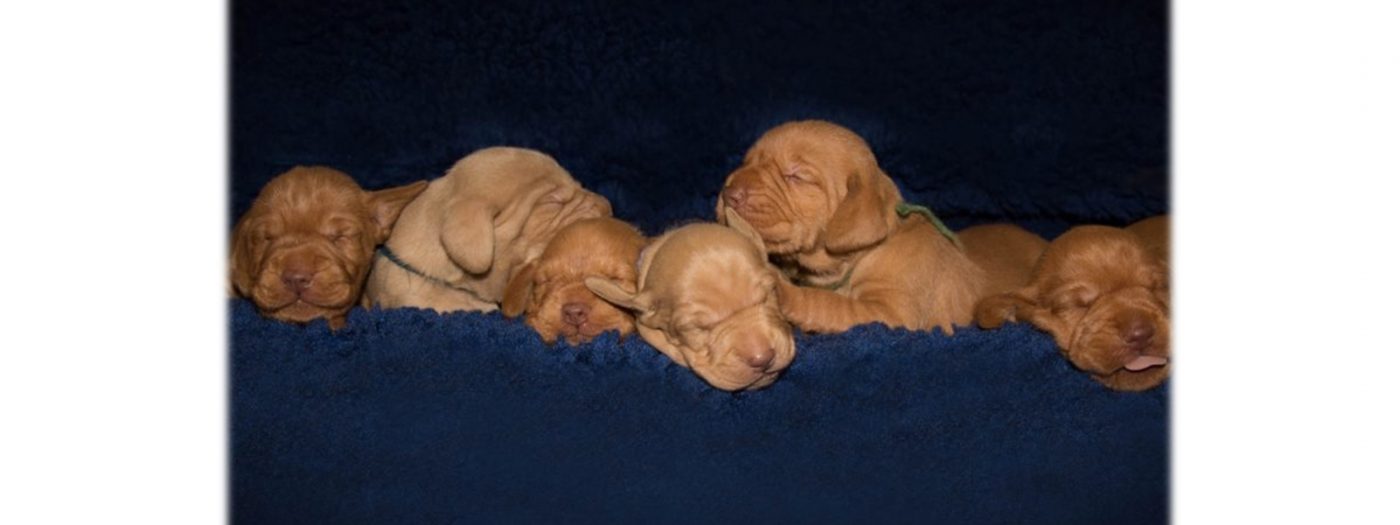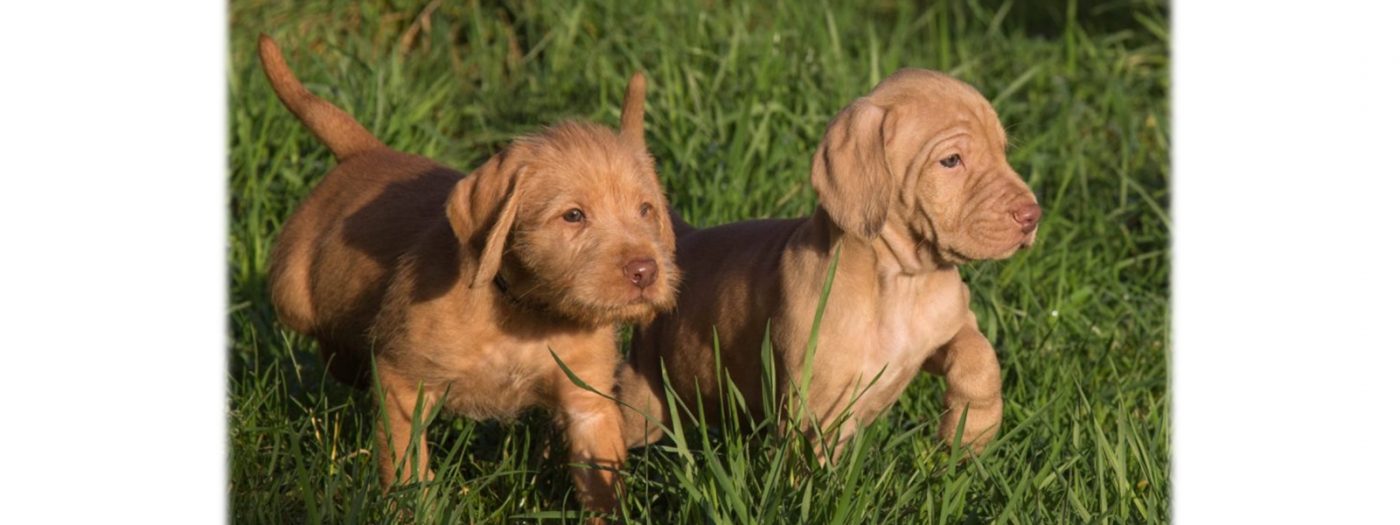HWV Breed Standard
Last updated January 2012
A Breed Standard is the guideline which describes the ideal characteristics, temperament and appearance of a breed and ensures that the breed is fit for function. Absolute soundness is essential. Breeders and judges should at all times be careful to avoid obvious conditions or exaggerations which would be detrimental in any way to the health, welfare or soundness of this breed. From time to time certain conditions or exaggerations may be considered to have the potential to affect dogs in some breeds adversely, and judges and breeders are requested to refer to the Breed Watch section of the Kennel Club website for details of any such current issues. If a feature or quality is desirable it should only be present in the right measure. However if a dog possesses a feature, characteristic or colour described as undesirable or highly undesirable it is strongly recommended that it should not be rewarded in the show ring.
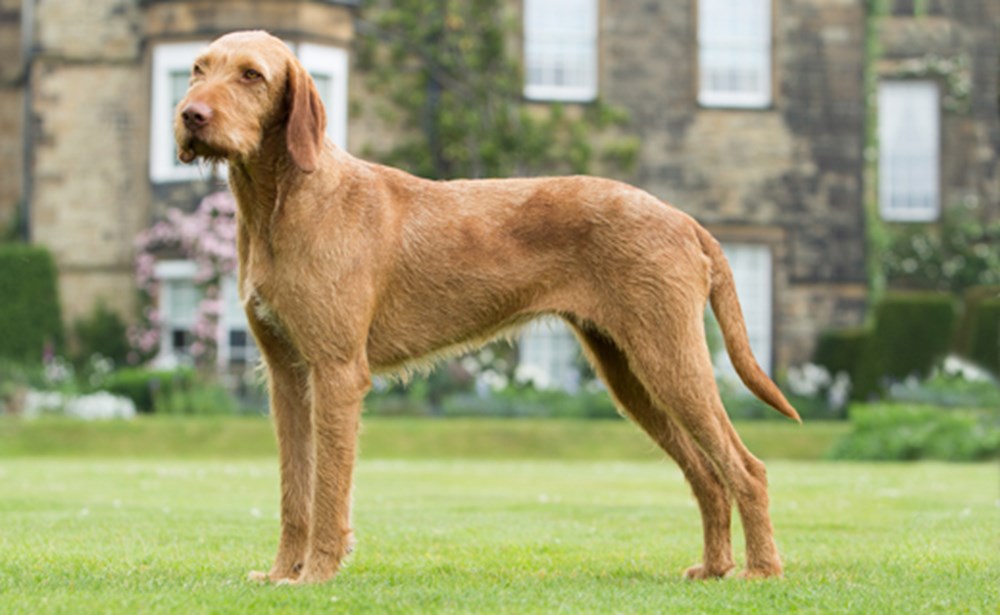
General appearance
Medium sized, wire coated, distinguished appearance, with a more robust build and a stronger bone structure than the shorthaired Vizsla.
Characteristics
Loyal, intelligent, obedient, sensitive, very affectionate and with patience, easily trained. Bred for hunting fur and feather, pointing and retrieving from land and water.
Temperament
Lively, gentle mannered and demonstrably affectionate.
Head and skull
Lively and intelligent expression. Skull moderately broad and slightly rounded, well proportioned and a little longer than muzzle, with moderate stop. Lips covering jaws completely and neither loose nor pendulous. Bridge of nose is straight and ends in a broad nose. The colour of the nose is harmonious with the coat colour. Coat covering the head gives the head a somewhat square striking appearance.
Eyes
Neither deep nor prominent, of medium size, and slightly oval in shape. Eyelids fitting tightly. Colour of eyes harmonises with coat colour, slightly darker shade desired. Yellow or black eye undesirable.
Ears
The ears are of medium set, proportionately long with a thin skin and hanging down close to cheeks. Rounded ‘V’ shape, not fleshy.
Mouth
Sound and strong white teeth. Jaws strong with perfect, regular and complete scissor bite, i.e. upper teeth closely overlapping lower teeth and set square to the jaws. Full dentition desirable.
Neck
Well muscled and of moderate length, slightly arched and devoid of dewlap.
Forequarters
Shoulders well laid and muscular, elbows close to body and forelegs straight. Forearm long, pasterns slightly sloping.
Body
Strong and well proportioned, slightly longer in body measured from point of shoulder to point of buttock than in height from withers to ground. Level back, slightly sloping croup rounded off towards tail set. Chest strongly developed, deep and reaching, at least, to elbows. Ribs moderately well sprung and carried well back.
Hindquarters
Straight when viewed from rear, thighs well developed with moderate angulation, hocks well let down.
Feet
Slightly oval with toes short, arched and tight. Nails short, strong and a shade darker than coat.
Tail
Previously customarily docked.
Docked: Customarily docked by one third of length. Moderately thick, and tapering towards the end. Slightly low set. When moving carried horizontally.
Undocked: Slightly low set. Moderately thick, slightly curved. Tapering towards the end, reaching to hocks. When moving, carried horizontally.
Gait/movement
Animated, flowing and ground covering, with a strong, rear driving action.
Coat
The wire coat on the neck and body is harsh and close fitting, up to 4 cms (1½ ins) long, with an undercoat, which is normally heavier in winter. The hair on muzzle is short and coarse, the hair forming a small beard on the chin. The skull is covered by short, dry hair. Hair on the ears is short and fine. The eyebrows are dense. The coat is shorter on the lower part of the legs, chest and belly. Longer hair is permitted on the rear of the legs. On the feet and between the toes the hair is softer and shorter. Coat on the tail is dense and stronger.
Colour
Golden sand to russet. Small white marks on chest and feet should not be penalised. Dark brown or pale yellow undesirable.
Size
Dogs 58cm to 62cm (23 – 24½ ins); Bitches 54cm to 58cm (21½ ins – 23 ins). Variance of less than 3 cms is permitted as long as the dog remains in proportion.
Faults
Any departure from the foregoing points should be considered a fault and the seriousness with which the fault should be regarded should be in exact proportion to its degree and its effect upon the health and welfare of the dog and on the dog’s ability to perform its traditional work.
Note
Male animals should have two apparently normal testicles fully descended into the scrotum.
Guide to finding a puppy
Having decided that the Hungarian Wirehaired Vizsla is the dog for you your search for a puppy will begin the HWVA has a Breeders List that is available on this site.
Hopefully the puppy that you eventually collect at around 8 weeks old will form part of your family for the next 12 years or so and it is important at this stage to do your homework thoroughly.
- Research the breed: A good way to gain an insight into the breed is to attend a few shows. You can check on the internet for details of dog shows these could be small local open shows, the HWVA’s own championship show held in March at Kenilworth, General Championship shows held up and down the country throughout the year or the Kennel Clubs own show Crufts held at the NEC in March. The Kennel Club also arrange Discover Dogs at ExCel in London in October. Attending a show as an observer will give you the opportunity to meet with the established breeders and exhibitors as well as other newcomers. It will also give you the opportunity to watch dogs in the ring and see whether you have any preference for dogs from any particular kennel. Exhibitors tend to be busy before their classes are judged and it is best to wait until judging has been completed before engaging them in conversation.
- Be prepared to wait for the right puppy: Unfortunately puppies do not always become available at the precise moment in time that you want one and this is when you may have to be patient and place you name on a waiting list. All responsible breeders will put you through the ‘third degree’ and it is right that they should. There is nothing wrong with putting your name on more than one waiting list but it is polite to subsequently remove your name from the list if you find a puppy elsewhere. This is a numerically small breed and breeders will know from each other that you have your names on more than one person’s puppy list.
- Expect to be asked questions and ask questions yourself: The breeder will want to know lots of information about you and your family set up, home and garden, working patterns and intentions regarding any activities you wish to pursue with your puppy and this is the ideal time for you to ask them for information about the bitch and sire of their litter.
- Ask about the bitches breeding history and the puppy’s parent’s health: You should ask the age of the bitch that is having the litter, generally a HWV bitch should not produce a litter before 2 years old or after she is 8 years old. Ask how many litters the bitch has had previously (no bitch should be expected to whelp more than 4 litters in her lifetime) and whether any of these were in the last 12 months, as it is preferable to have at least 12 months between litters. Ask about the health tests results of the parents, they should both be hip scored under the BVA scheme (hips should ideally be around or below the breed mean score, which is 11 (2015)) and tested for HUU (At least one parent should have a “clear” status if you wish to guarantee your puppy won’t be genetically “affected”. Puppies from other matings can be tested to check their genetic status). Details relating to Hip Scoring & HUU can be found in Health Information on this site. This is also an opportunity to ask about any known health issues the parents of the litter or their extended family may suffer from.
- Be prepared to meet the breeder in person before you collect the puppy: It is likely that the breeder will wish to meet you and the whole of your family before you actually reach the time when you collect your puppy and they may also want you to pay a deposit once the puppies feet are on the ground.
- Collecting the puppy and what to expect: Remember puppies should not change hands before the age of eight weeks and by law they must be microchipped. All puppies sold over the age of 12 weeks should ideally be fully vaccinated. The breeder of all puppies should provide a satisfactory diet sheet, complete health records, details of worming carried out, a copy of the puppy’s pedigree and KC registration papers. Certificates indicating the parent’s hip scores and HUU status should be available for inspection. The breeder may also provide insurance for the first few weeks that the puppy is with you and this something else you should discuss with them.
What to expect from your breeder when you collect your puppy
You’ve found your perfect puppy and breeder, so what should you expect when you collect your puppy.
A signed, by both parties, contract. This protects the breeder and buyer and ensures that all the relevant documentation that was agreed upon is available when you collect your puppy. It should include the breeders name, address, contact details such as e mail, mobile number and landline. The contract should identify the puppy by KC registration number, microchip number, name and sex. Any warranties or health claims must also be listed in the contract, along with the price. However you pay for your puppy, you should expect a receipt with the puppy identified on it. If the puppy is endorsed, you must be shown the endorsements on the regsitration documents. The contract should set out what the breeder will do if you need to return the puppy at any stage of its life, and all other responsibilities and agreements made between you and the breeder. Your contract may state that you need to have your own vet check the puppy within a certain time frame and what happens if your vet finds a problem with the puppy.
Your puppy pack should include
A health check certificate or consultation notes from the vet if the breeder claims the puppy has been health checked. This vet check should include eyes, ears, umbilical, testicles, teeth, heart, limbs and general condition. Anything remarkable should be commented on. Any treatment that the puppy has received, whilst in the care of the breeder, should be on the health check form and may make the free insurance invalid.
Your puppy’s pedigree (family tree)
Details about your puppy’s microchip and how to transfer ownership.
Information about your puppy’s vaccination (if relevant) and worming treatments
Kennel Club 5 weeks free insurance. Your breeder may have chosen another insurance, but you should have at least 4 weeks free insurance that covers your puppy for injury and accident from the time you collect him. This insurance must be activated BEFORE you take your puppy from the breeder, and you should have a cover note in your puppy pack. Delays at the Kennel Club in receiving the hard copies of registration documents does not mean that your puppy can’t be insured. As long as the breeder has registered the litter and the KC have e mailed back with the puppies names and registration numbers, the breeder can set the free insurance up for you.
Copies of health certificates regarding the puppy’s mother and father
You should also expect advice and guidance on socialisation, exercise and training, information about the breed, including advice on exercise, grooming, feeding, worming regime with dates treated, product used and dates that puppy needs worming in the future.
You should expect to be given, by the breeder enough food for a few days or your breeder should have ensured that you have food ready at home.
Collecting your puppy is an exciting time but DO make sure that everything is in order and that you have all the relevant paperwork. Should you need to claim on the insurance, return the puppy, should the puppy be diagnosed with an illness or condition, then you know what will happen and how your breeder will respond.
Now go and enjoy your puppy!
Information about breed relevant health tests can be found on our health pages by clicking here.
HWVA Breeders List
The HWVA operates a breeders list on which the details of members planning litters or having dogs available at stud can be seen. The list can be viewed on the HWVA web site and will be given to those who make enquiries about buying a puppy.
A minimum of 12 months membership of the HWVA is required before members are eligible for inclusion on the list. The list runs from January to December each year at a cost of £10.00 for the year. All members wishing to be included in the Breeders List must agree to the HWVA Breeders List Compliance.
Entry into our breeders list is dependent on the breeders and the stud dog owners being actively involved in Rehoming any dogs of their breeding.
If you wish to be included on the breeders list please send your cheque for £10.00 to the Treasurer, complete with your name, affix, phone number, county of residence, and web site and email addresses if applicable. Applications for inclusion on the breeders list will only be accepted up until August for the current year.
Advice for potential puppy owners :
For advice choosing a breeder, health screening and the right puppy for you we strongly recommend that you review the advice on the Kennel Club’s Website. We would also draw your attention to the Members Code of Conduct that contain a set of sensible practices for breeders to follow.
The HWVA has also produced guidance on buying a puppy which can be viewed here.
Please note that the HWVA accepts no responsibility for puppies sold by breeders on the HWVA Breeders List and does not endorse any of the breeders listed therein.
The List
| Forename | Surname | Affix | County | Telephone | Website | Stud Dog | |
|---|---|---|---|---|---|---|---|
| Joy | Allison | Scotland | 0131 6690300 | Yes | |||
| Hayley | Beardshall | Somerset | 01460 240914 | ||||
| Mr S & Mrs E | Bendikas | Holsan | Derbyshire | 01332 883673 | |||
| Tim | Branney | Belatarr | Devon | 07971 274693 | belatarr.co.uk | ||
| Caroline | Busby | Starshot | Surrey | 01784 462848 | starshot.co.uk | Yes | |
| Jean | Byrne | Enryb | Lancashire | 07774 782643 | enryb-weimaraners.org.uk | Yes | |
| Carole | Coxhead | Brecalde | Cheshire | 07745 958735 | Yes | ||
| Zoe | Dicker | Zoltarous | Wiltshire | 07900 245314 | zoltarous.co.uk | ||
| Jocelyn | Gale | Scotland | 07929 102124 | ||||
| Connie | Harris | Fitzrovia | Scotland | 01294 832283 | |||
| Mr R & Mrs W | Hawkins | Vadkacsa | Devon | 07886 226811 | wirehairedvizslas.co.uk | ||
| Lyn | MacKay | Northumberland | 07904224218 | ||||
| Karen | May | Amiryck | Devon | 05603 660818 | amiryck.co.uk | ||
| Elisabeth | Nation | FrankleyVizs | Birmingham | 07866 172538 | |||
| Rachel | Newman | Morganna | Derbyshire | 01335 360229 | Yes | ||
| Diane | Parry | Leiborschy | North Lincs | 01724 712326 | leiborschy.co.uk | Yes | |
| Janet | Reed | Cuffnels | Wiltshire | 01980 610064 | Cuffnelsdogs.co.uk | ||
| Tracie | Rickman | Herlinga | Norfolk | 07768 435215 | herlingagundogs.co.uk | ||
| Simon & Justine | Simms-Gould | Gunnerwood | Herefordshire | 07812 135199 | Yes | ||
| Rose & Nick | Summerfield | Miadsc | Cheshire | 07917 832275 | miadscgundogs.co.uk | Yes | |
| Janet | Sunter | Lyharr | North Yorkshire | 07813 614263 | Yes | ||
| Robin & Shaun | Sutton | Hornbeak | Herefordshire | 01544 388874 | Yes | ||
| Amanda | Taylor | Pondycott | Somerset | 07866 601592 | pondycottvizslas.co.uk | Yes | |
| Rachel | Thompson | Moricroft | Leicestershire | 01530 812293 | moricroft.com |
Rehoming
With the lifting of all Covid restrictions and the changes to the furlough scheme as it winds down, it is possible that we may have more families asking for our help to rehome their dogs as they return to more normal working patterns.
We are therefore reopening applications to people who are interested in welcoming an HWV into their family. If you would like to register your interest, please complete our PDF form here and return it to Diane Parry via email.
If you should need our help finding a new home for your HWV please contact Diane Parry for an informal discussion via email.
Please note that the PDF forms have been designed to be filled in on your computer. Please fill in the form and save it before emailing.
We are now working in partnership with Agria Pet Insurance Limited and all dogs rehomed via the HWVA will come with 5 Weeks Free pet insurance – whatever their age.
April 2022
